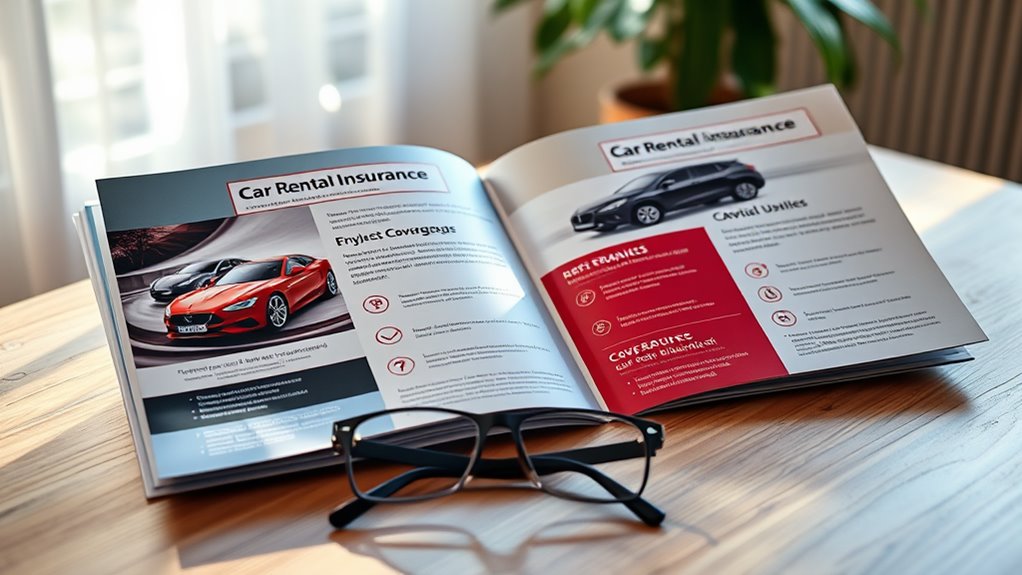Many renters overlook the nuances of car rental insurance, which can lead to unexpected costs. Understanding terms like Collision Damage Waiver (CDW) and Supplemental Liability Insurance (SLI) is essential for making informed decisions. Each provider offers varying coverage limits and deductibles, impacting your overall protection. To guarantee you're adequately covered and avoid surprises, it's important to analyze your options carefully. What should you be aware of before signing that rental agreement?
When you're planning a trip and assessing renting a car, understanding the various insurance policies available can greatly affect your overall costs and peace of mind. The options can be overwhelming, but knowing the key providers and their offerings helps you make an informed decision.
For instance, Bonzah provides up to $35,000 in rental car damage coverage with no deductible, along with up to $1 million in liability insurance. On the other hand, Insure My Rental Car offers a more extensive coverage option of up to $100,000, also with no deductible, available as either daily or annual policies. Each provider has unique strengths, so it's important to evaluate them based on your specific needs.
Different types of rental car insurance exist, which cater to various aspects of coverage. A Collision Damage Waiver (CDW) protects you against damages to the rental vehicle, while a Loss Damage Waiver (LDW) covers theft and other losses. If you're concerned about liability, Supplemental Liability Insurance (SLI) provides additional coverage beyond what standard insurance offers. Additionally, many rental car insurance policies offer affordable options, which can help you manage costs effectively.
Understanding the different types of rental car insurance, like CDW, LDW, and SLI, is essential for comprehensive coverage during your trip.
Personal Accident Insurance (PAI) is necessary for covering injuries that may happen during the rental period. Additionally, roadside assistance features support you in emergencies like tire changes or running out of gas, enhancing the overall rental experience. Many rental car insurance options also include coverage for personal effects, which can be beneficial if you travel with valuable items.
Cost is another key factor when comparing car rental insurance. Rental company insurance typically ranges from $10 to $30 per day, which can quickly add up. In contrast, standalone providers like Insure My Rental Car start at just $6 per day, making them an attractive option.
You might also find discounts by renting from non-airport locations or utilizing membership discounts. Moreover, many credit cards offer free rental car insurance, which can greatly reduce your out-of-pocket expenses.
It is important to assess any existing coverage you may have. Personal auto insurance often extends to rental cars used for leisure but may not cover business use, which necessitates separate coverage. If you plan to rent cars internationally, be aware that additional coverage is typically required, especially outside North America.
Reviewing your policies in detail is important to understand what's covered and what isn't. When you examine policy features, distinctions between primary and secondary coverage become important for cost management and claims handling.
Some providers also offer personal effects coverage, which protects items left in the rental car, such as laptops or passports. It's worth noting that cancellation policies can vary among providers, with some allowing free cancellation under specific conditions. Coverage limits also differ, impacting protection for luxury rentals.
Finally, understanding the claims process is crucial. Documenting incidents accurately guarantees a smoother claims experience. Promptly notifying the rental company about any incidents is essential for efficient claims handling, as this can accelerate the resolution process.
Conclusion
When it comes to car rental insurance, maneuvering your options is like steering through a maze. Each policy has its twists and turns, from Collision Damage Waiver to Supplemental Liability Insurance, and understanding the coverage limits and deductibles is essential. Don't forget to factor in your personal auto insurance and potential discounts. By thoroughly reviewing these details, you can guarantee you're adequately protected and steer clear of unexpected expenses during your rental experience.

